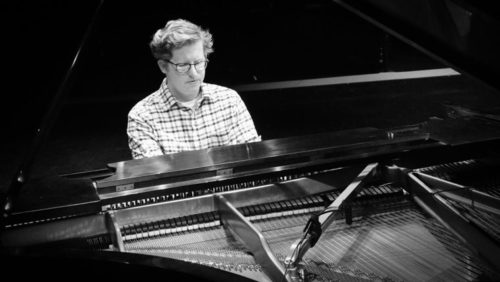Second-place winner in 2017 McCallum Theater’s Open Call competition

Photo by Jack Hartin
Some think artists are self-indulgent egotists glorying in their creative pursuits. The reality is often far more complex and demanding.
Michael Staff, local pianist, composer and teacher, was on the road to a major concert-performance career. He was preparing, at age 21, to enter the Van Cliburn International Piano Competition, one of the most prestigious in the world, when he suffered a nervous breakdown. His story — of fighting back to continue doing what he loved — is instructive, and is an inspiration to anyone who overcomes daunting setbacks to pursue their dreams.
Michael had and still has two career loves: math and music. “I started piano late,” said Michael, “at 13.” But he quickly progressed technically, and artistically recognizing how perfectly tuned and interwoven were his loves of math and music. Even as he resumes performances as a concert pianist, Michael is currently enrolled in a bachelor’s program in math at Western Governors University.
He recently won second place in the McCallum Theater’s 2017 Open Call competition at the College of the Desert campus in Palm Desert. It’s an important milestone and marks Michael’s reentry into a concert-performance career that derailed 12 years ago as he was preparing for the Van Cliburn competition. “I was studying with Dr. Tao Chang (Azusa Pacific University) and working on Tchaikovsky’s Piano Concerto No. 1, in B flat minor and Schumann’s Piano Concerto in A minor when I had the breakdown, precipitated by the pressure of preparation and some neurological issues,” he recounted.
He said he was no longer in a position to continue with a concert career, either emotionally or physically. He stopped playing and stepped away from music — at first to heal and then gradually, to regroup and find a way forward. “I started washing windows, mostly in the desert area, to earn money,” he said. “That’s what I did for over five years.”
When he was 23, Michael became engaged to his now wife Erin. They just celebrated their 10-year anniversary. And with her support and encouragement, he began, slowly, to consider returning to music as his profession. “I remember coming home day after day, trying to play through the Chopin ballades [Ballades 1 through 4] and some other favorites but my fingers were not responding because of the constant repetitive movement from window cleaning,” he remembered. “The frustration led to a depression that lasted several weeks. Eventually, I realized that it wasn’t worth it [to work at window cleaning] and that living is more than just surviving. So my wife helped me to gradually get enough piano students to quit any labor jobs which would deteriorate my [piano] abilities.”
Over time, at Erin’s urging, he resumed performing. “She saw how important music was to me and she saw performance potential that I did not see,” said Michael.
Even though he is a nine-year resident of Idyllwild, Michael has kept a decidedly low profile — until recently. “I played at Mile High Café for about a year, starting in 2014, then began to play at other events at the urging of friends,” he said. His performance at the McCallum was his reentry onto a main stage, playing the “Hitchcock Variations on Gounod’s ‘Marche Funèbre D’Une Marionnette.’” The video of the 18 finalists’ performances, published on DVD by Open Call, has the audience cheering when Michael finished. Performances took place Thursday, April 13, through Saturday April 15, to standing-room-only audiences.
Michael is a Renaissance man — an intellectual, an artist, a teacher, an author and a performer. In November 2015, he was nominated to create a lesson for TED Ed: “Lessons Worth Sharing” on the subject of math in music theory. The finished piece, “Group Theory 101: How to Play a Rubik’s Cube Like a Piano” is available online and is an intriguing linking of math and music (http://ed.ted.com/lessons/group-theory-101-how-to-play-a-rubik-s-cube-like-a-piano-michael-staff.) “The TED team said it was one of the hardest projects they’d done,” said Michael.
Michael also has his own youtube page, www.youtube.com/user/faustwaltzer, with videos ranging from lessons in music theory, mathematics in music, to recordings of some of his work as a composer/pianist.
He is writing a book, “Intersection, the Intersection of Math and Music,” which he plans to complete within the next couple years. He also is recording, in Hollywood, a CD of his own compositions, which he expects to complete in September.
Asked where, in his career, he would like to be in five years, Michael said, “I’d like to have my book completed, my album finished, be performing in concerts, introducing my own music and playing the music of others, be self-managed and promoting my own career.
“I think classical music is a dying genre and I’d like to be involved in making it more accessible and interesting to a wider audience. I think currently the way it is packaged is too dry, too esoteric and often too long, given shortening attention spans.
“I think there is a formula to create a balanced concert program — to have a theme, such as color; a subject such as oppression; and to balance compositions that are new with those that are more familiar to the wider audience. The human brain has the two sides, intellect and emotion. One needs to appeal to both, but overall, emotion prevails.
“Moments in life and in history also make music more powerful. A lot of my influence comes from outside of music — literature, history, political satire and mathematics. I’ve been very fortunate to be able to pursue what I love, especially when it’s working.”
It is working for Michael Staff and he has battled hard to put his career back on track — a phoenix rising and revitalized.










